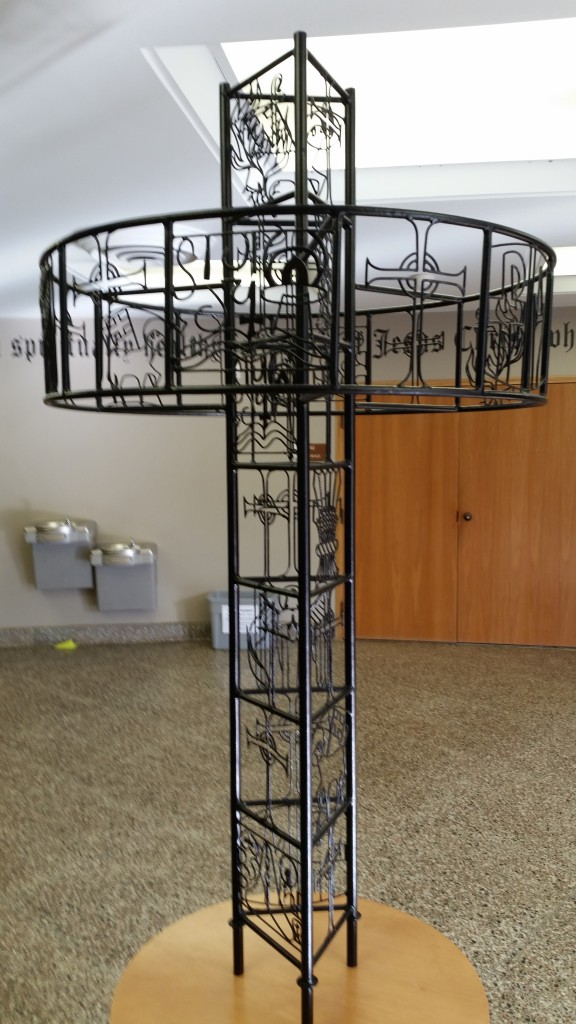JOB DESCRIPTION
When comfort turns to torment
And solace leads to pain
Then Job will find his master and
Receive his life again.
When ashes without number
Burn on the funeral pyre
Then suffering is consumed
And an end is made through fire.
Yet through the fire a figure
Stands golden, purified
The one who once was taunted
Has now been justified.
Not through the will of mortals
Nor through the countless saints
Can come the vindication
Of Job’s quite just complaints.
Let God be God, says Scripture
And all the world be wrong
For triumph comes through suffering
And life from life passed on.
The world has been left hanging
Upon a crooked tree
In Christ the microcosm
Life, through death, is set free.
At Easter dawn a trumpet
Blasts from an empty tomb
Announcing sin’s destruction
And death’s eternal doom.
“ I Know my Redeemer lives
And will stand upon the earth,
And in my flesh I’ll see him”
In resurrection’s birth.
Darkness lasts a little while
But joy comes with the dawn,
Then Job will see his savior,
And lament will turn to song.
10/21/92
THEOLOGICAL MUSINGS
The story of Job might seem an odd choice for a reflection as we head for Easter day, but in fact no figure in the OT more bears the image of the man of sorrows, well acquainted with grief than Job, and he is also the only OT saint who speaks of seeing his Redeemer stand upon the earth at the resurrection. The parallels between his story and the Christ story are interesting and telling. Both cry out that they have been abandoned by God. Both are vindicated after great suffering, and both are unjustly suffering as righteous persons, though both Job’s ‘comforters’ and Christ’s tormentors assume otherwise. Vindication comes as a surprise ending in both cases.
One of my favorite recent stories is the story of the woman who could not understand why in the last book of the OT God is called a silversmith. Since she was leading a Bible study on Malachi she decided she needed to go and visit a silversmith and see what his job description looked like. She got there in time for the day’s purification of the silver. The impure silver was poured into a heat resistant cup on the end of a very long pole and then inserted into the red hot kiln.
The woman noticed that once this happened the silversmith would not longer make eye contact with her, though they were still carrying on a conversation. Instead he concentrated on keeping the silver in the cup in the very hottest, the most blue part of the flame. He explained that this was necessary to purify the silver completely, and that if he took his eye off the silver even for a moment all could be spoiled for he needed to draw the silver out of the fire the very instant all the dross had been burned off. Suddenly, the light dawned in the woman’s brain. God gives us trials by fire not merely to test our metal, but to purify us, but equally clearly God will not hand down more than we can handle by relying on his grace. Instantly, when the purification point has come, God will take us out of the fire. To be truly tested, and truly pure, one must go through the fire, not around it. Triumph comes through suffering, and through overcoming suffering, not by avoiding it.
Easter is of course about the triumph over the grave. But it only comes at a price—in this case not merely of suffering but of death. God’s yes to life was proved to be louder than death’s no, not merely by Jesus saying he was the Resurrection during his ministry, but by his being resurrected and becoming the living proof that this was so.
I was once preaching in the Durham and Darlington circuit in the late 70’s in England. It was Easter Sunday morning and the little Methodist chapel was decked out for the occasion. The chapel steward raced out of the door when he saw me coming up the hill at a good pace and he stopped me. He looked flustered and like he was mustering up his courage. He asked me in his ever so polite British way: “I must ask you something sir, before we go in. You do believe in the resurrection don’t you?” I reassured him I did and the relief was written all over his face. He then said “I’m ever so glad to hear it because last year we had a chap who didn’t and he preached such utter rubbish about the blooming of the flowers and the coming of spring, as if the resurrection was an annual natural occurrence.”
No indeed, resurrection is not a natural occurrence, and it requires death as its predecessor. It’s something only God can bring about, the God who is the very definition of life, and who longs to give us all everlasting life. The story of Job in fact has a happy ending, but it comes at a great cost of suffering. The same can be said about the story of Christ. Real triumph comes after and sometimes through real tragedy in God’s economy of things it would seem. This is something to bear in mind throughout Eastertide













